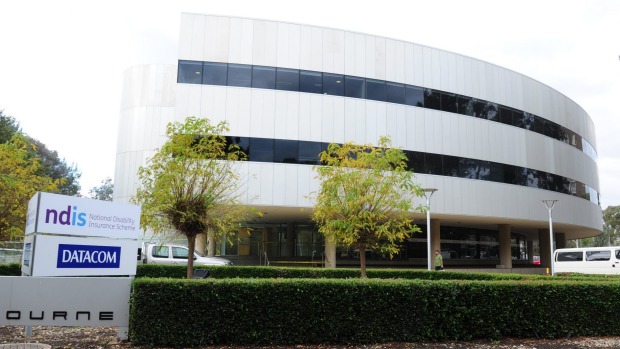
The National Disability Insurance Agency workforce is expected to double over the next year as Canberrans transition to the NDIS. Photo: Melissa Adams
Just 28 planners are working to move close to 500 Canberrans onto the National Disability Insurance Scheme (NDIS) by the end of the year, prompting complaints that “swamped” workers are making the process take longer than it should.
By July 2016, 5075 Canberrans are expected to access the NDIS.
But so far just 103 eligible participants have had plans approved – only 56 per cent of the 185 people expected to transition to the scheme between July to September, latest data shows.
Australia-wide just 62 per cent of participants had their plans approved compared to what was expected for the quarter.
But National Disability Insurance Agency (NDIA) operations general manager Liz Cairns said the NDIA was happy with the progress made to date in the ACT.
“All efforts are being taken to ensure the agency can support people to access the scheme as set out in the bilateral agreement,” she said.
She rejected suggestions the agency was overstretched and said the ACT workforce was expected to more than double over the next 12 months.
Already the numbers of eligible Canberra participants was greater than expected under revised modelling with an extra 14 people, the quarterly report showed.
During 2014-15, 1537 Canberrans are expected to transition to the NDIS at a cost of $24.3 million, according to the agreement signed off by Chief Minister Katy Gallagher and then Prime Minister Julia Gillard in 2012.
By the end of 2014, Canberra’s 28 planners are expected to have transitioned at least 472 people onto the NDIS as per the “ages and stages” transitioning timetable determined by date of birth or by academic year for school-aged individuals.
But several parents, who have children set to access the scheme, have told the Canberra Times the NDIA’s planning support co-ordinators appear ill-equipped for the mammoth task and cast doubt over the training staff have received.
The mother of a two-year-old girl with cerebral palsy, who was due to transition onto the NDIS between October and December this year, said her daughter’s plan was yet to be finalised.
Her daughter currently undergoes physiotherapy, speech therapy, occupational therapy and hydrotherapy as well as needing support equipment including a walking frame, communication device and a specialised pram and high chair.
The mother, who declined to be named, switched NDIA planners after being unhappy with her daughter’s draft NDIS plan and being given incorrect information.
“I found there was a lack of information provided to me and when I questioned things the planner wasn’t sure about the answers… which I found concerning,” she said.
“I felt there was a lack of connection… there wasn’t really much attempt to understand my situation.”
While she was pleased NDIA staff appeared willing to take feedback, she was surprised the “wrinkles” and “misinformation” hadn’t been ironed out after NDIS trials in other jurisdictions.
“It may be that it’s being pushed through very quickly in the ACT and there hasn’t been time to train people fully, especially when they don’t have a pre-existing knowledge of disability services,” she said.
Qualifications as a therapist or work experience in the community services or disability sectors were “preferred but not essential” criteria for NDIA planners who “came from a range of backgrounds”, Ms Cairns said.
“A number have allied health qualifications, have worked within the disability sector and others have a lived experience of disability,” she said.
But she said all planners underwent “comprehensive induction training” before they work with participants and were offered ongoing learning and development tailored to their needs.
Jennifer Merriman, whose 3-year-old son Rhye will access early intervention programs under the scheme in 2015, said planners were “swamped”.
Her eight-year-old daughter Leira, who also has development delays, would usually have transitioned to the scheme on April 1, 2015, like other primary school-aged children.
But as the youngest member of each household dictates the timeframe, she was supposed to have transferred to the NDIS from October like her brother.
Ms Merriman said she was frustrated Leira’s plan was yet to be approved.
Ms Cairns said the number of planners needed for Canberra was calculated based on the agreed phasing of NDIS participants and staffing numbers would be adjusted.
